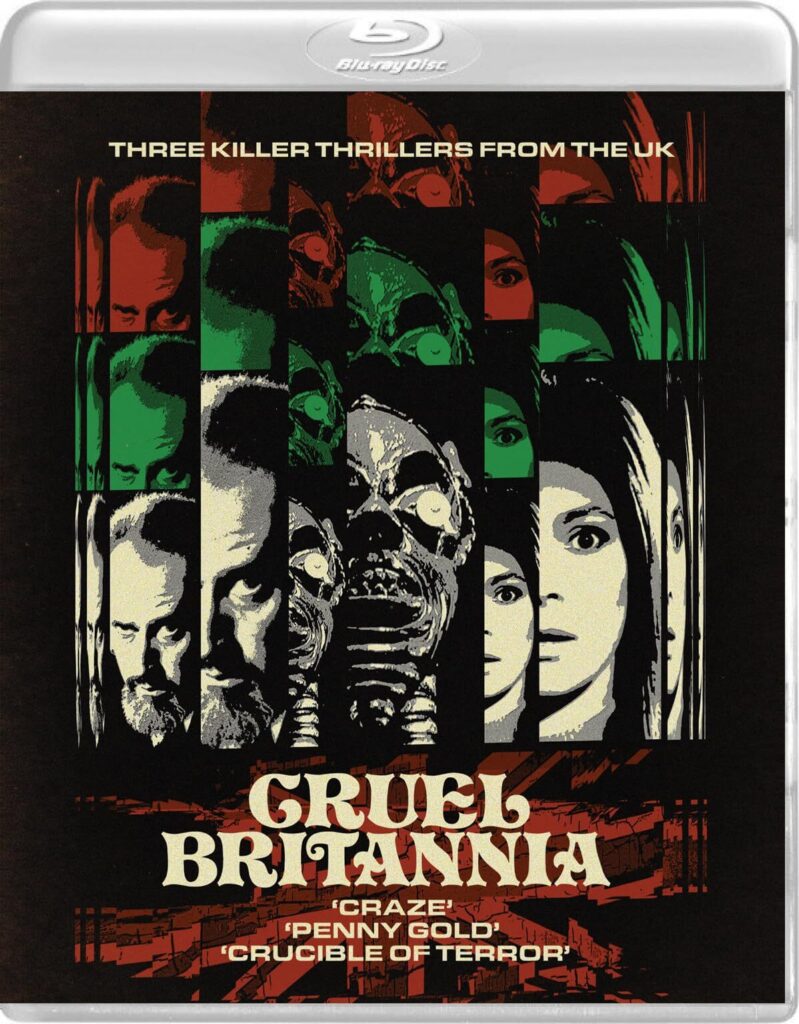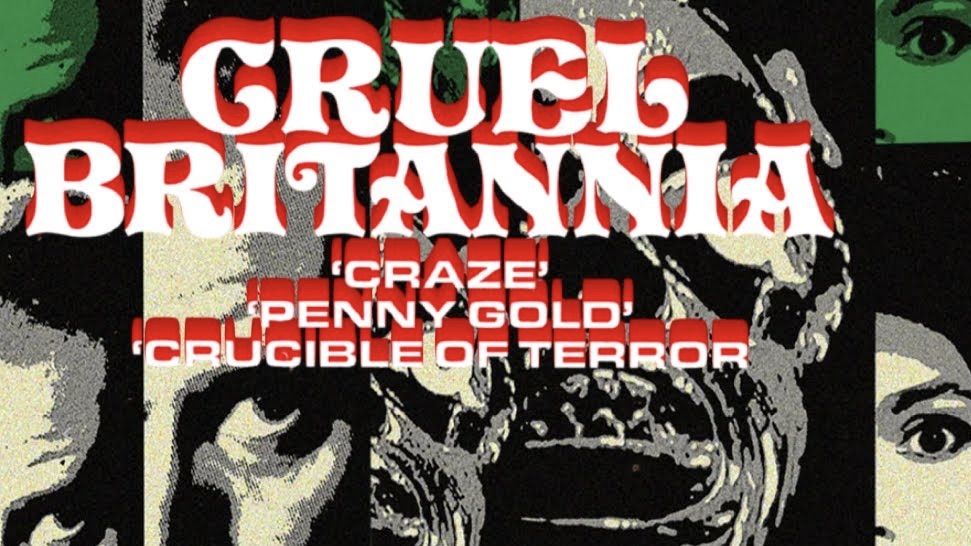I have a real fondness for British horror movies…everything from Hammer Studios to Amicus to Pete Walker’s disturbing shockers to the gory fun of films from Tigon and Norman J. Warren. But the mouth-watering new collection of “Three Killer Thrillers From the UK” from Vinegar Syndrome– Cruel Britannia– is especially exciting for me since I had never seen any of them. Craze, starring Jack Palance and directed by Freddie Francis had only been available in piss-poor, muddy messes with excruciatingly bad sound on home video, so I never bothered watching it. And I’m a big fan of the horror films directed by award-winning cinematographer Freddie Francis. These three rarities from the 1970s are now given new life (and possible re-evaluation) on Blu-ray- and they all look incredible.
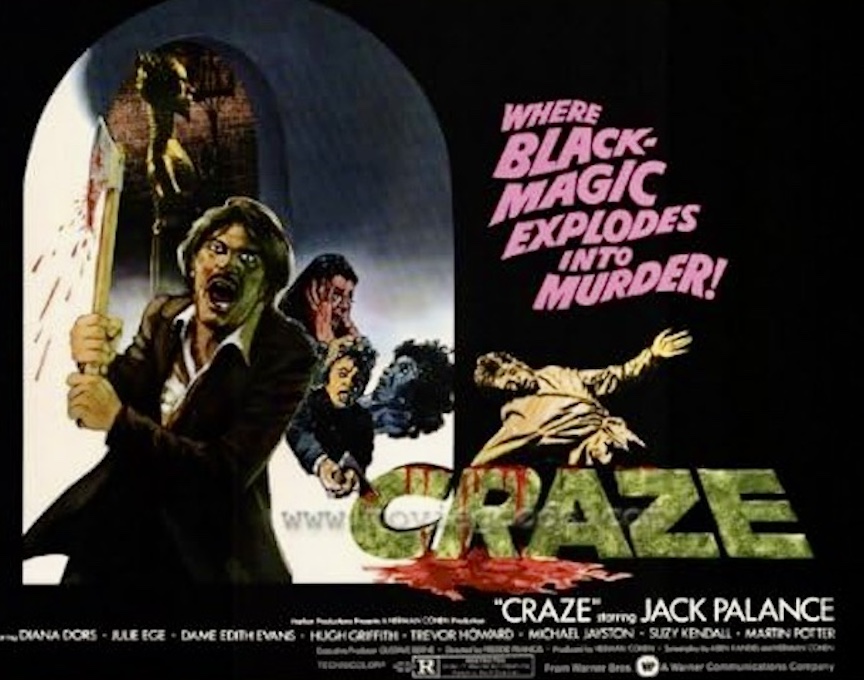
Craze (1974). Directed by Freddie Francis, and based on the book Infernal Idol by Henry Seymour, it stars the legendary Jack Palance, who has a real has a field day chewing the scenery as Neal Mottram, a psychotic antiques dealer- who worships an African God in the cellar named Chuku. (The carved deity itself, with large yellow button eyes, is pretty hilarious). He also believes that bringing human sacrifices to his beloved idol will bring him wealth and protection. One of the first, accidental, sacrifices is played by the crazed nun in Black Narcissus (Kathleen Byron). Martin Potter (Fellini Satyricon) plays Palance’s assistant Ronnie, who is horrified by the killings but is scolded by his boss. “You were starving, a filthy rag, a beggar when I picked you up. Sleeping in Hyde Park, hustling old queens when you could turn a trick! I took you in, cleaned you up, clothed, housed and fed you, taught you a profession!” So, Ronnie reluctantly helps his boss dispose of the bodies. Michael Jayston plays the suspicious Detective Sgt. Wall, who immediately thinks Mottram is guilty. “You’re a real lady killer, aren’t you?” asks the suspicious detective. “I do my share,” replies Palance smoking one of his imported, black cigarettes. Wonderfully blowsy Diana Dors plays a sexy alibi for Palance (he drugs her cherry brandy and sneaks out to kill his wealthy Aunt (Edith Evans) by driving a wooden stake through her neck). Trevor Howard and Hugh Griffith make an appearance also. Produced by Herman Cohen and writing partner Abel Kandel, the gay subtext included in several of their films is discussed during the lively, informative audio commentary on the disc by David DeCoteau and David Del Valle. One phenomenal extra is a fascinating interview with actor Michael Jayston, who honestly, and amusingly, discusses his incredible career on stage and in film, working with everyone from Laurence Olivier to his frightening performance as Teddy in Harold Pinter’s The Homecoming, to starring in big budget films like Nicholas and Alexandra. It’s a real treat listening to him, especially relating what an enjoyable and oddball experience it was working with Jack Palance in Craze. I tried to imagine other actors who could have played the lead at that time, like Peter Cushing or Michael Gough. What Palance brings to the role might be way over-the-top, but it’s still so memorably cracked it makes the film a hell of a lot more entertaining.
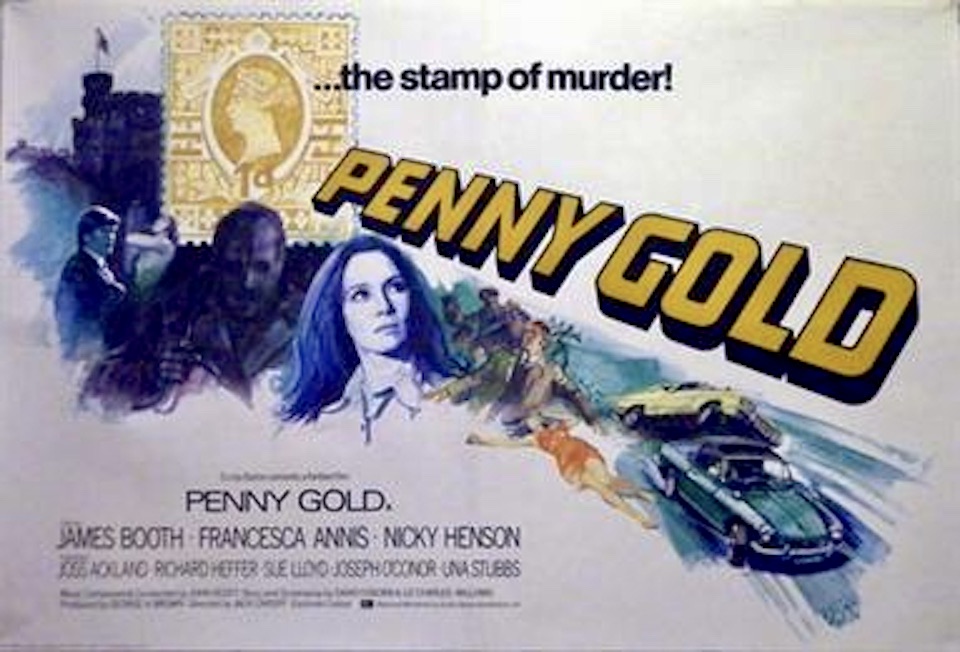
Penny Gold (1973) Offbeat British mystery directed by master cinematographer Jack Cardiff (who shot many classic films for Michael Powell and Emeric Pressburger). Cardiff was also nominated for an Academy Award for direction of Sons and Lovers (1960). The “Penny Gold” of the title refers to a priceless stamp which is the crux of the mystery. The plot also revolves around twin sisters Diane and Delphi (gorgeous Francesca Annis, who played Lady Macbeth in Roman Polanski’s Macbeth). Delphi works with her stepfather, who deals in rare stamps. And Diane lives above a dress shop which she runs. Diane is brutally murdered at the beginning of the film and Matthews (James Booth), a detective is determined to find the fiend who killed her. He also finds himself smitten with her twin sister Delphi. Soon there is another murder, disguised as an accident and Matthews has to weed through the suspects to prevent another death from occurring. It’s a film I was totally unfamiliar with, and, while it may not be the “undiscovered classic” one hoped for, it is handsomely made and has a few killer twists.
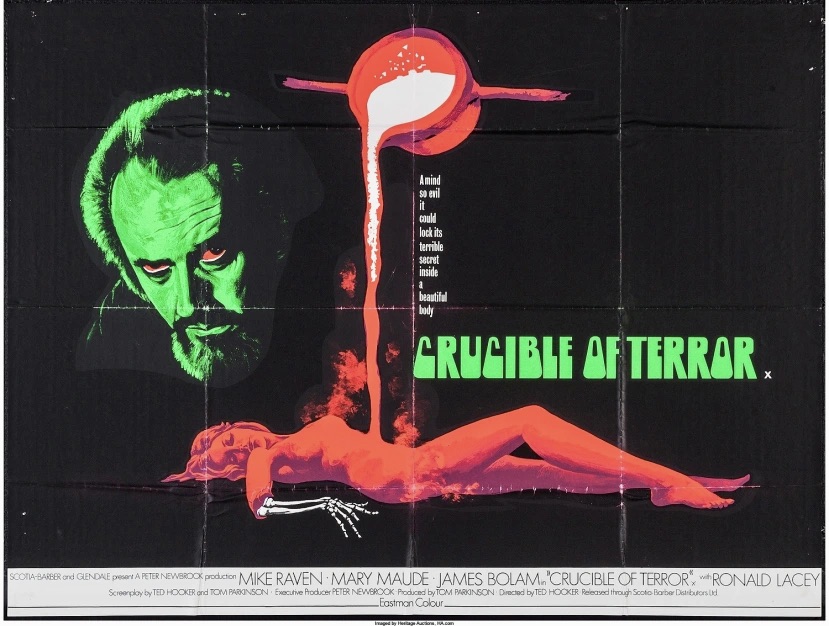
Crucible of Terror (1971) A series of violent murders surround a reclusive artist who lives at a remote seaside enclave in Cornwall over what once was a doomed tin mine. An art dealer (James Bolam) is desperate to save his gallery and takes his lovely girlfriend Millie (Mary Maude) with him to try to convince a mysterious artist- Victor Clare (Mike Raven) to let him exhibit his work. He travels with Victor’s alcoholic son Michael (Ronald Lacey) and Michael’s feisty girlfriend (Beth Morris). When they arrive there, they encounter Clare’s bonkers wife (Betty Alberge). who dresses like she’s 10 and carries around dolls, and a sexy model (Judy Matheson) posing for Clare. Soon a series of bizarre killings begin and, believe-it-or-not, it’s connected to a haunted kimono which contains the vengeful spirit of a murdered cult member (Me Me Lai/Man from Deep River). This is the only film ex-TV editor Ted Hooker ever directed. An extra includes actress Judy Matheson describing how she got the part and remained friends with fellow actor Mary Maude and was unimpressed with Mike Raven as an actor. Mike Raven was a former BBC Radio DJ who Hammer Studios tried to promote as the next Christopher Lee by starring him as the bloodthirsty Count Karnstein in Lust for a Vampire (1971). Amicus snapped him up for I, Monster (1971), but a star was not born. Then came the ill-advised stink bomb Disciple of Death (1972) which Raven produced, co-wrote and starred in. Playing the womanizing sculptor in Crucible of Terror did introduce Raven to Cornwall and he moved his family there and began carving erotic and religious art sculptures under his real name Churton Fairman. He died in 1997 and was buried by his family and friends in a favorite spot in the heart of Bodmin Moor.
The set comes with a booklet containing three essays on the films by Simon J. Ballard, Jon Dear and Adrian Smith.
